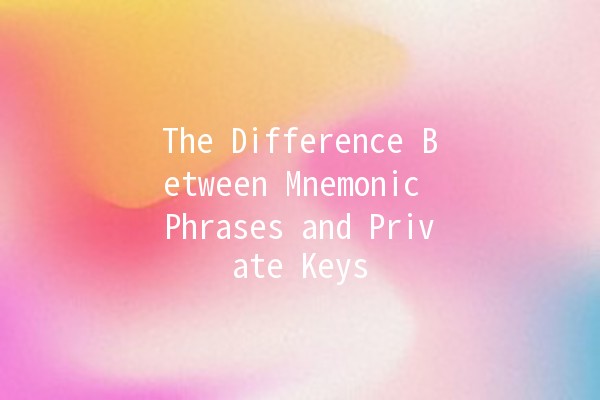




In the world of cryptocurrencies and digital assets, security is of utmost importance. As individuals engage with blockchain technology, two crucial concepts come to the forefront: mnemonic phrases and private keys. Understanding the difference between these two elements is vital for anyone looking to manage their digital currencies securely. This article will delve into the distinctions, advantages, and best practices related to mnemonic phrases and private keys while providing five productivity tips to enhance your security measures.
A mnemonic phrase, also known as a seed phrase or backup phrase, is a series of randomly generated words that serve as a humanreadable representation of a wallet's private key. Typically consisting of 12 to 24 words, mnemonic phrases are designed to help users remember their keys more easily. This method of encoding is particularly useful in the context of cryptocurrency wallets, where accessing your funds requires a private key.
Benefits of Mnemonic Phrases:

When creating a new wallet, users are typically presented with a mnemonic phrase upon initialization. For instance, suppose your mnemonic phrase is:
"apple, banana, cherry, date, elderberry, fig, grape, honeydew, kiwi, lemon, mango, nectarine."
This phrase grants access to your private keys, meaning anyone who knows this phrase has complete control over the wallet.
A private key is a cryptographic key that is used to sign transactions and gain access to a digital wallet. This key is a secret string of numbers and letters that proves ownership of the funds within a wallet. Unlike mnemonic phrases, private keys do not have a standardized length and can be expressed as a hexadecimal string.
Characteristics of Private Keys:
A private key might look something like this:
"5JgXKsQywH3Kb1qH1B3uGhos9h2D9UoH7t8pBCdPcNr9L856xf5."
When you want to send cryptocurrency from your wallet, you need to sign the transaction with this private key, confirming your ownership and authorization of the transfer.
| Feature | Mnemonic Phrase | Private Key |
||||
| Format | Series of words (1224 words) | Alphanumeric string (variable length) |
| Purpose | Easy wallet recovery | Signing transactions and accessing funds |
| Complexity | Easier to memorize | Difficult to remember |
| Standardization | Based on BIP39 | No universal standard |
| Security | Less secure if not kept private | Highly secure, but must be kept secret |
Hardware wallets provide physical devices that store your private keys offline, making them less vulnerable to online threats. By using a hardware wallet, you can maintain the security of your mnemonic phrases and private keys while accessing your cryptocurrencies.
Application Example: When setting up a hardware wallet, follow the manufacturer's guidelines to generate a mnemonic phrase securely. Write it down and store it in a safe place.
Using strong, unique passwords to access your wallet management software is crucial. Avoid using easily guessable passwords or the same password across multiple services.
Application Example: Create a password manager that generates complex passwords and stores them securely, ensuring that your access points remain uncompromised.
TwoFactor Authentication adds an extra layer of security by requiring a second form of verification when accessing your wallet. This is usually a code sent to your mobile device or generated by an authentication app.
Application Example: Whenever possible, enable 2FA on your cryptocurrency accounts. This will provide an additional safeguard against unauthorized access.
Regular backups of your wallet ensure you don't lose your funds in case of accidental deletion or hardware failure. Store both your mnemonic phrase and wallet backups in secure locations.
Application Example: Use cloud storage with robust encryption to save a secure backup of your wallet file and write down your mnemonic phrase in a fireproof safe.
Technology evolves rapidly, and so do security vulnerabilities. Staying informed about the latest security practices and software updates helps protect your wallet.
Application Example: Subscribe to news feeds related to cryptocurrency security and follow reputable sources on social media to keep your knowledge current.
If you lose your mnemonic phrase, you may lose access to your wallet forever. It is crucial to back up and store your mnemonic phrase securely.
Yes, gaining access to your mnemonic phrase allows a hacker full control over your wallet and funds. Always keep this information private.
Your private key is essential for signing and verifying transactions on the blockchain. Without it, you cannot prove ownership of the funds you wish to transfer.
No, storing your private key online increases the risk of it being hacked. Always keep it secure and offline whenever possible.
No, your mnemonic phrase is generated based on your wallet's private key and cannot be changed. Ensure it is kept secure from the beginning.
If you notice unauthorized transactions from your wallet or if your funds disappear, it may indicate that your private key has been compromised. Monitor your wallet regularly for any suspicious activity.
Understanding the differences between mnemonic phrases and private keys is vital for safeguarding your cryptocurrency investments. By implementing the tips provided and staying informed, you can enhance your security posture and protect your digital assets effectively.